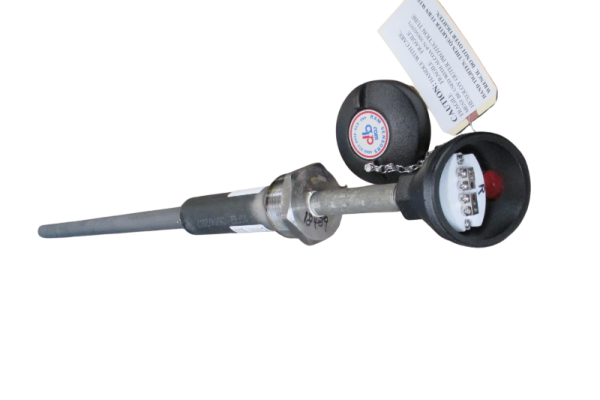Toll Free: (800) 888-8987 | Phone: (440) 835-3540 | office@ramsensors.com
Protection Tube Assemblies
Protection tubes are generally used in non-pressure environments to protect thermocouples against contamination or mechanical damage. Designed for high temperature applications, protection tubes are available in metal and ceramic models, which can withstand temperatures as high as 2100°F and 4100°F, respectively.
Used in various industrial and power applications, protection tube assemblies must be rugged and are often made from industrial piping. For added resilience, they can be mineral-sheathed or ceramic-insulated. Connection heads are often manufactured with aluminum, iron, or stainless steel.
Optional protection tube materials:
Ceramic. Dense, fine grained, nonporous compositions that remain gas-tight even at temperatures near their melting point. Ceramic tubes are generally used at high temperatures with platinum type thermocouples. However, their use with base metal thermocouples is prevalent in atmospheres harmful to metal tubes and not subjected to mechanical abuse. Ceramic tubes will sag at high temperatures, so if they are installed horizontally and used above their sagging temperatures, they should be fully supported. Sag temperature is the temperature at which the tube will sag 1/4" in one hour. Ceramics will retain moisture at room temperature. This moisture may become trapped in the ceramic and cause the destruction of the tube when it is thermally shocked. It is recommended that ceramic tubes be preheated to approximately 400°C (750°F) in order to drive off this moisture before subjecting them to high heat.
Metal 304, 316, 310, 446 Stainless steels or Inconel 600:
Hexoloy. Protection tubes are made from sintered alpha (SA) silicon carbide. They are impermeable to gases at pressures up to 4500 psig and their fine grain structure provides high strength and excellent resistance to abrasion and corrosion (50% harder than tungsten carbide). Usable to working temperatures of 1650°C (3000°F). Hexoloy tubes are characterized by excellent thermal conductivity properties, which provide high thermal transfer and rapid response times (10 times silicon nitride, 3 times stainless steel). Its low thermal expansion results in high creep resistance and high resistance to thermal shock (10 times alumina oxide). Hexoloy contains no free silicon, which provides superior chemical resistance in both reducing and oxidizing environments. It is non-toxic, therefore suitable for use in food and drug service. Hexoloy cannot be used where there is iron present. When used with platinum thermocouples, a ceramic (alumina) liner tube is required. Hexoloy becomes conductive at high temperatures.
Silicon Carbide (SiC). SiC tubes are highly resistant to flame and gases. These tubes are usable to temperatures of 1650°C (3000°F) and are characterized by high thermal conductivity, excellent thermal shock properties and good resistance to most corrosive liquids including molten aluminum. Since silicon carbide tubes are porous, they are used as a secondary protection against extreme temperature, abrasive atmospheres and direct flame impingement. Primary mullite or alumina tubes are required when noble metal thermocouples are used with silicon carbide tubes. This double tube arrangement often doubles the life of the thermocouple for less than a third increase in the cost of the assembly.
LT-1 Metal Ceramic. Metal-ceramic tubes are a combination of chromium and alumina for use at temperatures up to 1370°C (2500°F). They provide excellent oxidation resistance, thermal conductivity comparable to that of stainless steel, good resistance to wetting by most molten metals, excellent resistance to wear and abrasion at high temperatures and are gas tight at high temperatures. A primary alumina tube is recommended when used in conjunction with platinum thermocouples.
Lava-Coated. Lava-coated protection tubes provide excellent thermal conductivity for quick response to temperature changes. They comprise silicon carbide/graphite isostatically formed around a threaded pipe. These tubes are designed for monitoring the holding and melting temperatures of aluminum and other nonferrous alloys up to 1250°C (2280°F).
Sialon. Sialon is a high-strength ceramic with superior heat and abrasion resistance characteristics. These tubes have high thermal shock resistance and can be used at temperatures up to 1250°C (2280°F). They are chemically inert and resistant to corrosion and chemical attack. They are not wetted by non-ferrous metals and are ideal for use in molten aluminum.
Cast
Iron. Cast
iron
is
a
low
cost
material
used
in
molten
aluminum
and
aluminum
alloy
applications
and
also
has
good
resistance
to
acid
and
caustic
solutions.
It
has
good
thermal
conductivity
and
shock
resistance.
Maximum
working
temperatures
of
800°C
(1470°F)
reducing;
700°C
(1300°F)
oxidizing.
A
ceramic
coated
cast
iron
tube
is
also
available.
The
coating
is
non-wetting
and
adds
resistance
to
deformation
and
oxidation
while
providing
protection
against
solution
attack
during
continuous
immersion
in
molten
aluminum,
zinc,
or
lead.
You Can Trust RAM
RAM Sensors, Inc. produces protection tube assemblies that are proven to be reliable and accurate. We know that it's vital that you have access quality products so our varied product line offers high quality protection tubes for your specific temperature sensing needs.
If you're in need of explanation or help in choosing the best components for your unique application, please feel free to contact us. We are ready to help you find the ideal solution.





